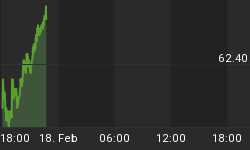BIG PICTURE - I have a suspicion that the recent insane market volatility would have caused some sleepless nights throughout the investment world. There can be no doubt that the current year did not commence well with widespread declines in the capital markets, resulting in the selling nadir which forced the Federal Reserve to cut rates aggressively. A few days later, in an effort to boost the ailing American economy, the extremely intelligent US establishment announced its own bailout package worth roughly US$150billion. These measures helped to stabilise the situation and the markets have been consolidating over the past few days.
Now, I am aware that there are many skeptics who are not impressed by the monetary easing. These folks believe that the central banks are only compounding the current problems by adding more fuel to the already raging inflationary fire. According to them, the ongoing monetary and fiscal stimulus will not work as the US consumer is already stretched to the limit and cannot possibly spend any more. For sure, the skeptics have a point. It is worth noting that since the beginning of this decade, Americans financed their consumption binge by using their homes (which were appreciating in value) as ATMs. In other words, home equity extraction became a major source of financing for households in the US. Unfortunately, the housing boom ended abruptly in 2006. Consequently, home equity extraction has contracted ever since whilst the personal savings rate seems to have bottomed out (Figure 1).
Figure 1: A problem for the US economy?
Source: www.yardeni.com
Surely, the above development is not a healthy sign for the US economy given the fact that consumer spending accounts for roughly 70% of GDP. In my view, the ongoing housing recession will continue for several months and this should act as a headwind for economic growth in the US. However, where I differ in my assessment from the dire forecasts of the bears is that I expect the latest bout of monetary and fiscal easing to work (like it always has), thereby inflating stock-markets worldwide. Over the past several months, central banks and various Sovereign Wealth Funds have pumped billions of Dollars into the financial system and I expect this infusion of "money" to ultimately support the stock market in the US and elsewhere. Remember, this is an election year in the US and the American establishment will tolerate either a deflating housing market or a declining stock market but not both. So, you can bet your farm that everything will be done to inflate the stock-market so that Americans are feeling happy and "wealthy" before they go and vote!
It is interesting to note that ever since gold was removed from the monetary system in the early 1970's, regular financial crises have been the norm rather than the exception. And the response of the central banks following each crisis has always entailed creating additional inflation via lower interest-rates (Figure 2). Let it be known that it is these bouts of monetary easing which have provided the fuel necessary for the next bubble or mania in the capital markets.
Figure 2: Financial Crisis = Monetary easing
Source: www.yardeni.com
You may remember that 1987 brought with it the infamous "Black Monday" when the Dow plummeted in a single day. Back then, the Federal Reserve responded to the crash by pumping liquidity into the system, thus setting the stage for a massive bubble in Japanese assets. Unfortunately for investors, the Japanese mania ended in tears in 1990, resulting in widespread wealth destruction. A few years later, the financial world got jolted again by the Asian Crisis (1997) and Long-Term Capital Management Crisis (1998) and again the Federal Reserve responded by slashing interest-rates and injecting more liquidity into the system. Over the next couple of years, this particular round of monetary easing spawned and fueled the biggest asset-bubble of all-time - the technology bubble which popped in early 2000. The bursting of the NASDAQ bubble at the beginning of this century caused serious pain to the business world (with the exception of the CEO's at Silicon Valley who made fortunes at the expense of the investing public) and threw the economy into a recession. Once again, the Federal Reserve (under the glorious leadership of Mr. Greenspan) decided to tackle the bear by dropping interest-rates to a miniscule 1% - a multi-decade low. Even though the US recession was relatively mild at that time and ended in November 2001, the Federal Reserve left interest-rates unchanged for several months, thereby creating a massive housing bubble in the US. Like all previous credit-induced booms however, the housing bubble burst in 2006; creating the ongoing sub-prime and credit crises. Now, if history is any guide, over the months ahead, I suspect the Federal Reserve will wage an all-out inflationary war which will create a massive bubble in the emerging-markets of Asia and Latin America. At this stage, it is impossible to forecast when the emerging-markets bubble will end but if I had to guess, I would say that the day of reckoning will probably arrive in 2010.
Turning back to the current situation in the US, opinion is divided as to whether the US will slip into recession, thereby triggering a global bear-market. It is my view that when adjusted for true inflation, the world's largest economy is already in recession. However, I doubt very much if the official statisticians working in Washington will ever admit to a recession in this election year. So, I would have to conclude that at least in the eyes of the mainstream media, the US will avoid a recession not least due to all the help being provided by the officials.
Given the crazy monetary inflation and subsequent debasement of currencies taking place today, I suspect commodities (metals, food and energy) will continue to power ahead.
















